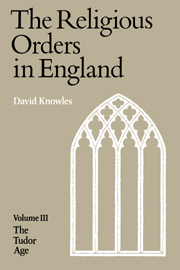Book contents
- Frontmatter
- Contents
- Preface
- List of Abbreviations
- Part One The Tudor Scene
- Part Two The Gathering Storm
- Part Three Suppression and Dissolution
- Chap. XVI Before the Dissolution
- Chap. XVII The end of the Observants
- Chap. XVIII Syon
- Chap. XIX The London Charterhouse and its sister houses
- Chap. XX The economy of the monasteries in 1535
- Chap. XXI Servants, almsgiving and corrodians
- Chap. XXII The visitation of 1535–6
- Chap. XXIII The Act of Suppression and the case for the defence
- Chap. XXIV The dissolution of the lesser houses
- Chap. XXV The Northern Rising
- Chap. XXVI The last phase
- Chap. XXVII The attack on the greater houses
- Chap. XXVIII The suppression of the friars
- Chap. XXIX The cankered hearts
- Chap. XXX The transformation of the buildings
- Chap. XXXI The new cathedrals and colleges
- Chap. XXXII The disposal of the lands
- Chap. XXXIII The treatment of the dispossessed
- Part Four Reaction and Survival
- Appendix I Sir Thomas More's letter ‘to a monk’
- Appendix II Religious houses suppressed by Cardinal Wolsey
- Appendix III The witness of the Carthusians
- Appendix IV Houses with incomes exceeding £1000 in the Valor Ecclesiasticus
- Appendix V The sacrist of Beauvale
- Appendix VI Itinerary of the visitors, 1535–6
- Appendix VII The commissioners for the survey of the Lesser Houses in 1536
- Appendix VIII The conflict of evidence on the monasteries
- Appendix IX The last abbots of Colchester, Reading and Glastonbury
- Appendix X Regulars as bishops
- Bibliography
- Index
Chap. XXI - Servants, almsgiving and corrodians
Published online by Cambridge University Press: 08 January 2010
- Frontmatter
- Contents
- Preface
- List of Abbreviations
- Part One The Tudor Scene
- Part Two The Gathering Storm
- Part Three Suppression and Dissolution
- Chap. XVI Before the Dissolution
- Chap. XVII The end of the Observants
- Chap. XVIII Syon
- Chap. XIX The London Charterhouse and its sister houses
- Chap. XX The economy of the monasteries in 1535
- Chap. XXI Servants, almsgiving and corrodians
- Chap. XXII The visitation of 1535–6
- Chap. XXIII The Act of Suppression and the case for the defence
- Chap. XXIV The dissolution of the lesser houses
- Chap. XXV The Northern Rising
- Chap. XXVI The last phase
- Chap. XXVII The attack on the greater houses
- Chap. XXVIII The suppression of the friars
- Chap. XXIX The cankered hearts
- Chap. XXX The transformation of the buildings
- Chap. XXXI The new cathedrals and colleges
- Chap. XXXII The disposal of the lands
- Chap. XXXIII The treatment of the dispossessed
- Part Four Reaction and Survival
- Appendix I Sir Thomas More's letter ‘to a monk’
- Appendix II Religious houses suppressed by Cardinal Wolsey
- Appendix III The witness of the Carthusians
- Appendix IV Houses with incomes exceeding £1000 in the Valor Ecclesiasticus
- Appendix V The sacrist of Beauvale
- Appendix VI Itinerary of the visitors, 1535–6
- Appendix VII The commissioners for the survey of the Lesser Houses in 1536
- Appendix VIII The conflict of evidence on the monasteries
- Appendix IX The last abbots of Colchester, Reading and Glastonbury
- Appendix X Regulars as bishops
- Bibliography
- Index
Summary
No feature of the monastic economy in Tudor days has been more severely criticized than the alleged superfluity of servants and dependants. The numbers are certainly formidable when seen in the aggregate at a large house, and when compared with the numbers of the religious. Thus at Rievaulx there were, at the Dissolution, one hundred and two ‘servants’ to twenty-two monks; at Gloucester the ratio was eighty-six to twenty six; at Byland eighty to twenty-five; and at Butley seventy-one to thirteen. Moreover, quite apart from precise figures, there are the recurrent complaints of visiting bishops over two or more centuries, while the satirists and reformers dilate upon the hordes of lazy dependants who do nothing but eat and sleep; the term ‘abbey lubber’ was indeed coined to describe such men and their likes.
There is, therefore, every excuse for the general reader to suppose that the monastic servants were a principal cause of any insolvency that might exist, and there has been a marked tendency on the part of both critics and apologists of the monks to stress, if not to exaggerate, the figures for their different purposes. The strictures of Coulton and others are familiar to all; on the other hand Gasquet, writing seventy years ago and concerned to emphasize the disturbance to society caused by the disappearance of the monasteries, did not hesitate to say, after fixing the number of dispossessed religious at eight thousand, that ‘probably more than ten times that number of people were their dependents or otherwise obtained a living in their service’.
- Type
- Chapter
- Information
- The Religious Orders in England , pp. 260 - 267Publisher: Cambridge University PressPrint publication year: 1979



